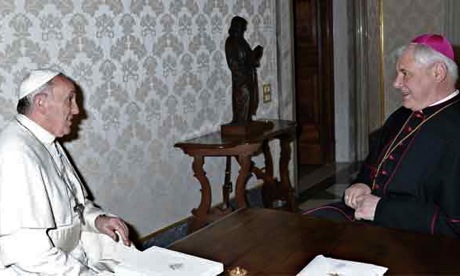Pope Francis has directed the Congregation for the Doctrine of the Faith to “act decisively” on cases of priestly sex abuse.
The Pope discussed the congregation’s responsibilities for at least an hour on April 5 with its prefect, Archbishop Gerhard Muller, but the formal statement following the meeting referred only to dealing with sexual abuse.
The statement said the Holy Father “recommended in particular that the congregation continue the line desired by Benedict XVI of decisive action regarding cases of sexual abuse, primarily by promoting measures for child protection; help for the many who in the past have suffered such violence; due process against those who are guilty; the commitment of bishops’ conferences in the formulation and implementation of the necessary directives in this area which is of great importance to the witness of the Church and its credibility”.
The statement added that the Pope “assured that the victims of abuse and their suffering are especially present in his thoughts and prayers”.
While he was archbishop of Buenos Aires, the future Pope Francis said in a book-length series of interviews that sexual abusers suffer from a “perversion of a psychological kind” that is not caused by or directly linked to celibacy.
“If a priest is a pedophile, he is so because he brought that perversion with him from before his ordination”, and not even priestly celibacy would be able to “cure it”, he said.
Because such a perversion would already be present in a candidate, “it’s necessary to pay lots of attention to the choice of candidates to the priesthood”.
He said the archdiocese of Buenos Aires had been very “rigorous” in vetting candidates for the priesthood, noting that only about 40 per cent were actually admitted into seminaries.
The Congregation for the Doctrine of the Faith asked episcopal conferences to submit by June 2012 guidelines for preventing sexual abuse and dealing with cases.
Earlier this year, more than 75 per cent of bishops’ conferences worldwide had complied. The majority of those still working on the guidelines are in Africa.
Sources:
Image: L’Osservatore Romano
